Readings Newsletter
Become a Readings Member to make your shopping experience even easier.
Sign in or sign up for free!
You’re not far away from qualifying for FREE standard shipping within Australia
You’ve qualified for FREE standard shipping within Australia
The cart is loading…






This title is printed to order. This book may have been self-published. If so, we cannot guarantee the quality of the content. In the main most books will have gone through the editing process however some may not. We therefore suggest that you be aware of this before ordering this book. If in doubt check either the author or publisher’s details as we are unable to accept any returns unless they are faulty. Please contact us if you have any questions.
Violent television programs are highly preferred by children. They stimulate their emotions and increase curiosity about violence-related issues. This means that watching violent television programs has an impact upon their way of perceiving the world around them and acting in response to it. This study investigated the impacts of watching violent television programs on secondary school children in Tanzania. The specific objectives were: to examine children’s accessibility to the TV, ascertain the types of violent TV programs and the time children spend watching them, determine the ways in which watching violent TV programs affects their academic performance, find out the impact of watching violent TV programs on their discipline, and examine the role of parents in addressing the impacts of watching violent TV programs upon their children. Results indicate that most secondary school children watch violent TV programs at home in the sitting rooms. They spend an average of three hours per day on weekdays, and seven-and-half hours on weekends, watching movies, music, drama, and informational programs that were identified as the most violent ones. Obviously, spending lots of time watching violent TV programs decreases children’s academic performance and discipline. This book is important because it discusses the parents’ role in discouraging and limiting children from watching violent TV programs, and choosing appropriate TV programs for them.
$9.00 standard shipping within Australia
FREE standard shipping within Australia for orders over $100.00
Express & International shipping calculated at checkout
This title is printed to order. This book may have been self-published. If so, we cannot guarantee the quality of the content. In the main most books will have gone through the editing process however some may not. We therefore suggest that you be aware of this before ordering this book. If in doubt check either the author or publisher’s details as we are unable to accept any returns unless they are faulty. Please contact us if you have any questions.
Violent television programs are highly preferred by children. They stimulate their emotions and increase curiosity about violence-related issues. This means that watching violent television programs has an impact upon their way of perceiving the world around them and acting in response to it. This study investigated the impacts of watching violent television programs on secondary school children in Tanzania. The specific objectives were: to examine children’s accessibility to the TV, ascertain the types of violent TV programs and the time children spend watching them, determine the ways in which watching violent TV programs affects their academic performance, find out the impact of watching violent TV programs on their discipline, and examine the role of parents in addressing the impacts of watching violent TV programs upon their children. Results indicate that most secondary school children watch violent TV programs at home in the sitting rooms. They spend an average of three hours per day on weekdays, and seven-and-half hours on weekends, watching movies, music, drama, and informational programs that were identified as the most violent ones. Obviously, spending lots of time watching violent TV programs decreases children’s academic performance and discipline. This book is important because it discusses the parents’ role in discouraging and limiting children from watching violent TV programs, and choosing appropriate TV programs for them.